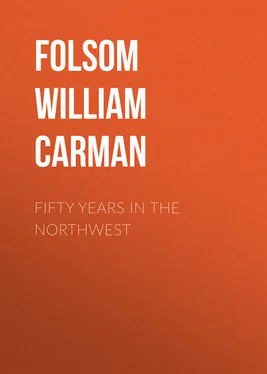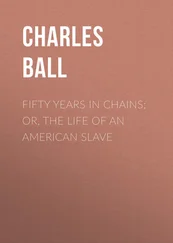William Folsom - Fifty Years In The Northwest
Здесь есть возможность читать онлайн «William Folsom - Fifty Years In The Northwest» — ознакомительный отрывок электронной книги совершенно бесплатно, а после прочтения отрывка купить полную версию. В некоторых случаях можно слушать аудио, скачать через торрент в формате fb2 и присутствует краткое содержание. Жанр: История, foreign_antique, foreign_prose, на английском языке. Описание произведения, (предисловие) а так же отзывы посетителей доступны на портале библиотеки ЛибКат.
- Название:Fifty Years In The Northwest
- Автор:
- Жанр:
- Год:неизвестен
- ISBN:нет данных
- Рейтинг книги:3 / 5. Голосов: 1
-
Избранное:Добавить в избранное
- Отзывы:
-
Ваша оценка:
- 60
- 1
- 2
- 3
- 4
- 5
Fifty Years In The Northwest: краткое содержание, описание и аннотация
Предлагаем к чтению аннотацию, описание, краткое содержание или предисловие (зависит от того, что написал сам автор книги «Fifty Years In The Northwest»). Если вы не нашли необходимую информацию о книге — напишите в комментариях, мы постараемся отыскать её.
Fifty Years In The Northwest — читать онлайн ознакомительный отрывок
Ниже представлен текст книги, разбитый по страницам. Система сохранения места последней прочитанной страницы, позволяет с удобством читать онлайн бесплатно книгу «Fifty Years In The Northwest», без необходимости каждый раз заново искать на чём Вы остановились. Поставьте закладку, и сможете в любой момент перейти на страницу, на которой закончили чтение.
Интервал:
Закладка:
The fort erected by the Americans under Gen. Clarke in 1814 was called Fort Shelby. The British, on capturing it, changed the name to Fort McKay. The Americans, on assuming possession and rebuilding it, named it Fort Crawford. It stood on the bank of the river at the north end of St. Friole, the old French village occupied in 1876 by the Dousmans. In 1833 the new Fort Crawford was built on an elevated site about midway in the prairie. It was a strong military post and was commanded at this time by Gen. Zachary Taylor. Many officers, who subsequently won distinction in the Florida Indian, Mexican, and late Civil War, were stationed here from time to time. Within a time included in my own recollections of the post, Jefferson Davis spirited away the daughter of his commanding officer, Gen. Taylor, and married her, the "rough and ready" general being averse to the match.
Prairie du Chien derived its name from a French family known as du Chien, in English "The Dog." By this name the Prairie was known long prior to the establishment of the French stockade and post. By that name it has been known and recognized ever since. It has been successively under the French, English and United States governments, and lying originally in the great Northwestern Territory, in the subsequent divisions of that immense domain, it has been included within the bounds of the territories of Ohio, Indiana, Illinois, Michigan, and Wisconsin. Gov. Wm. H. Harrison, of Indiana Territory, recognized Prairie du Chien by issuing commissions to Henry M. Fisher and – Campbell as justices of the peace, the first civil commissions issued for the American government in the entire district of country including West Wisconsin and Minnesota east of the Mississippi. Prior to this time, about 1819, the inhabitants had been chiefly under military rule. In 1819 the county of Crawford was organized as a part of Michigan Territory, and blank commissions were issued to Nicholas Boilvin, Esq., with authority to appoint and install the officers of the new county government. Gov. Lewis Cass established by proclamation the county seat at Prairie du Chien, and John W. Johnson was installed as chief justice of the county court. The entire corps of officers were qualified. In January, 1823, Congress passed an act providing for circuit courts in the counties west and north of Lake Michigan, and James Duane Doty was appointed judge for the district composed of Brown, Mackinaw and Crawford counties, and a May term was held in Prairie du Chien the same year.
Indian Troubles. – There were some Indian troubles, an account of which is given in the biographical sketch of J. H. Lockwood. There were other incidents which may be worthy of separate mention. In 1827 an entire family, named Methode, were murdered, as is supposed, by the Indians, though the murderers were never identified. The great incentive to violence and rapine with the Indians was whisky. An intelligent Winnebago, aged about sixty years, told me that "paganini," "firewater" (whisky), was killing the great majority of his people, and making fools and cripples of those that were left; that before the pale faces came to the big river his people were good hunters and had plenty to eat; that now they were drunken, lazy and hungry; that they once wore elk or deer skins, that now they were clad in blankets or went naked. This Indian I had never seen drunk. The American Fur Company had huts or open houses where the Indians might drink and revel.
At an Indian payment a young, smart looking Indian got drunk and in a quarrel killed his antagonist. The friends of the murdered Indian held a council and determined that the murderer should have an opportunity of running for his life. The friends of the murdered Indian formed in a line, at the head of which was stationed the brother of the dead man, who was to lead in the pursuit. At a signal the bands of the prisoner were cut, and with a demoniacal yell he bounded forward, the entire line in swift and furious pursuit. Should he outrun his pursuers, he would be free; should they overtake and capture him, they were to determine the mode of his death. He ran nearly a mile when he tripped and fell. The brother of the dead Indian, heading the pursuit, pounced upon him and instantly killed him with a knife.
Considering the fact that the Indians were gathered together under the guns of a United States fort, and under the protection of a law expressly forbidding the sale of intoxicating liquors to them, the people of the United States were certainly justified in expecting better results, not only in regard to the protection of the frontier settlers but for that of the Indians themselves. All came to naught because of the non-enforcement of law. Liquors were shamelessly sold to the Indians and they were encouraged to drunken revelry and orgies by the very men who should have protected and restrained them.
The prosperity of Prairie du Chien depended upon the Indian trade, and upon government contracts which the presence of a military force rendered necessary. The Indians gathered here in great numbers.
Here the Winnebagoes, part of the Menomonies and some Chippewas received their annuities, and here centred also an immense trade from the American Fur Company, the depot being a large stone building on the banks of the Mississippi, under the charge of Hercules Dousman.
FORT CRAWFORD ROBBED
Two discharged soldiers (Thompson and Evans) living at Patch Grove, thirteen miles away, visited the fort often. On a morning after one of their visits a soldier on guard noticed a heap of fresh earth near the magazine. An alarm was given, an examination made, and it was found that the magazine had been burst open with bars and sledge hammers, entrance having been obtained by digging under the corner picket. Three kegs of silver, each containing $5,000, were missing. The kegs had been passed through the excavation underneath the picket. One keg had burst open near the picket, and the silver was found buried in the sand. The second keg burst on the bank of the Mississippi, and all the money was found buried there except about six hundred dollars. The third keg was found months after by John Brinkman, in the bottom of the river, two miles below the fort. He was spearing fish by torchlight, when he chanced to find the keg. The keg he delivered at the fort and received a small reward. On opening the keg it was found to contain coin of a different kind from that advertised as stolen. Brinkman, however, made no claims on account of errors. Thompson, Evans, and a man named Shields were arrested by the civil authorities on suspicion; their trial was continued from term to term and they were at last dismissed. One man, who had seen the silver in the sand during the day and gone back at night to fill his pockets, was seized by a soldier on guard, imprisoned for a year, and discharged.
EARLY JUSTICE
A Frenchman shot and killed a couple of tame geese belonging to a neighbor, supposing them to be wild. Discovering his mistake, he brought the geese to the owner, a Dutchman, who flew into a great rage, but took the geese and used them for his own table, in addition to which he had the goose-killer arrested and tried before Martin Savall, a justice of the peace. The defendant admitted the killing of the geese, the plaintiff admitted receiving them and using them for food, nevertheless the justice gave judgment in favor of plaintiff by the novel ruling that these geese, if not killed, would have laid eggs and hatched about eight goslings. The defendant was therefore fined three dollars for the geese killed, and eight dollars for the goslings that might have been hatched if the geese had been permitted to live, and costs besides. Plaintiff appealed to the district court which reversed the decision on the ground that plaintiff had eaten his geese, and the goslings, not being hatched, did not exist. Plaintiff paid the costs of the suit, forty-nine dollars, remarking that a Dutchman had no chance in this country; that he would go back to Germany. The judge remarked that it would be the best thing he could do.
Читать дальшеИнтервал:
Закладка:
Похожие книги на «Fifty Years In The Northwest»
Представляем Вашему вниманию похожие книги на «Fifty Years In The Northwest» списком для выбора. Мы отобрали схожую по названию и смыслу литературу в надежде предоставить читателям больше вариантов отыскать новые, интересные, ещё непрочитанные произведения.
Обсуждение, отзывы о книге «Fifty Years In The Northwest» и просто собственные мнения читателей. Оставьте ваши комментарии, напишите, что Вы думаете о произведении, его смысле или главных героях. Укажите что конкретно понравилось, а что нет, и почему Вы так считаете.












